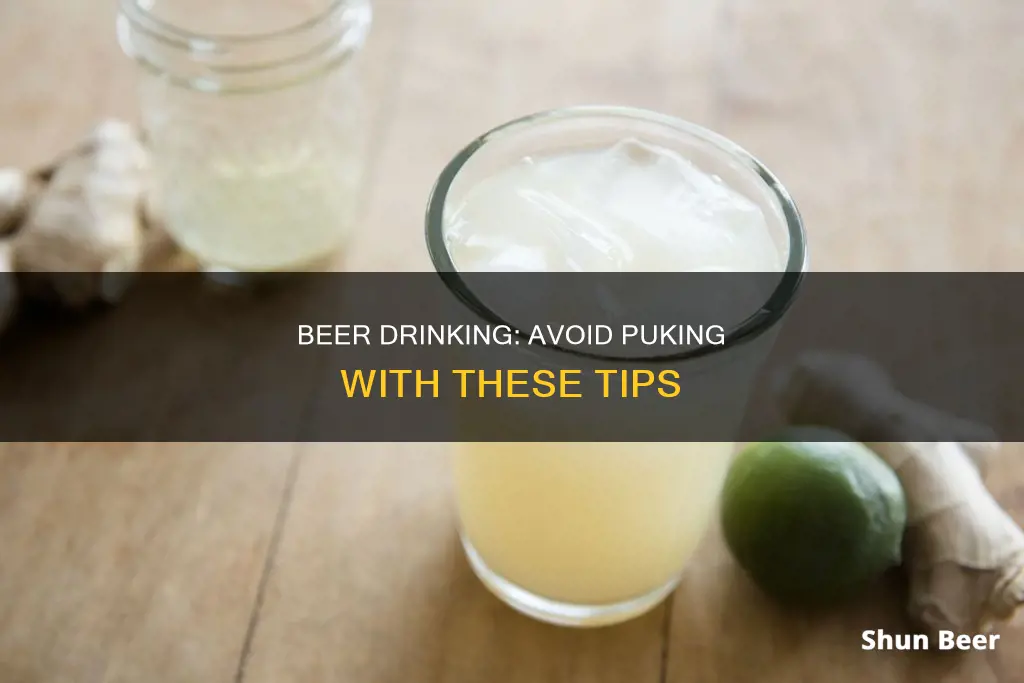
Drinking alcohol can be fun, but throwing up after a night of drinking is not. Vomiting is your body's way of getting rid of toxins in the alcohol. While it may help you feel better, throwing up from drinking can cause serious health problems. Here are some tips to help you avoid throwing up the next time you drink beer:
- Know your alcohol limit and stick to it. Different people have different alcohol tolerances, so it's important to know your limit and not exceed it.
- Pace yourself and drink slowly. Try to limit yourself to one drink per hour.
- Drink water in between alcoholic drinks to stay hydrated and slow your alcohol intake.
- Eat something before drinking alcohol to help slow the absorption of alcohol into your bloodstream.
- Avoid darker-coloured alcoholic beverages, as they are more likely to cause hangovers.
- Get some fresh air if you start to feel nauseous.
- Listen to your body, and stop drinking if you start to feel sick.
What You'll Learn

Eat small amounts of bland food, like crackers or toast
Eating small amounts of bland food, such as crackers or toast, is a good way to keep your energy up and reduce nausea after drinking alcohol. These foods require less digestion and are therefore less likely to irritate the lining of your stomach and intestines.
If you've been vomiting, wait a little while after you've been sick before eating, to reduce the likelihood of triggering the vomiting reflex again. Start with small bites and go slowly.
Other foods that can help include bananas, rice, applesauce (the BRAT diet), plain oatmeal, and grits. For 24-48 hours after vomiting, avoid foods that can upset your stomach or make nausea worse, such as fatty, greasy, sugary, or spicy foods, dairy products, alcohol, soda, and caffeinated beverages.
Oregon's Deli Drinking Laws: Beer with Your Sandwich?
You may want to see also

Drink small sips of water to rehydrate
Drinking small sips of water is a great way to rehydrate and prevent dehydration, which can interfere with your body's circulation and lead to more serious complications. Here are some tips to help you rehydrate effectively:
- After throwing up, drink small sips of water every 15 minutes for the first 3-4 hours. You can also suck on ice chips if you're feeling warm.
- If you're struggling to keep fluids down, wait about 30 minutes after vomiting before sipping water.
- In addition to water, you can sip on clear fluids and drinks with electrolytes, such as broth, sugar-free ginger ale, sports drinks, or apple juice.
- Drinking water in between alcoholic drinks is a good way to prevent dehydration and slow your alcohol intake. Aim for 8 to 12 ounces of water for every alcoholic drink.
- If you're feeling nauseous, drinking water can help settle your stomach and reduce the likelihood of vomiting.
- Overall, staying hydrated is an important part of preventing and recovering from vomiting caused by drinking alcohol.
Beer and Rectal Bleeding: Is There a Link?
You may want to see also

Take an over-the-counter pain reliever, like ibuprofen
Drinking alcohol can be a fun way to socialise, but it can also lead to some unpleasant side effects, like vomiting. While throwing up is your body's way of ridding itself of harmful substances, it can leave you feeling awful for a day or two. So, what can you do to prevent it?
One option is to take an over-the-counter pain reliever like ibuprofen. Ibuprofen is a nonsteroidal anti-inflammatory drug (NSAID) that can help to reduce pain, swelling, and fever. It's important to note that mixing ibuprofen and alcohol can have some risks and side effects, especially with long-term use or heavy drinking. However, taking a small dose of ibuprofen with a moderate amount of alcohol is usually safe. Here are some things to keep in mind:
- Stomach irritation and bleeding: Ibuprofen and alcohol can both irritate the stomach and digestive tract, increasing the risk of ulcers and bleeding. This risk is higher with long-term use of ibuprofen or heavy alcohol consumption.
- Kidney damage: Ibuprofen and alcohol can both strain the kidneys, and combining them can lead to more severe kidney problems over time.
- Liver damage: While ibuprofen alone does not cause long-term liver damage, adding alcohol to the mix can increase the adverse effects on the liver, leading to more severe liver problems.
- Cardiovascular problems: Ibuprofen is linked to cardiovascular issues, and drinking alcohol adds to these risks, making it harder for the body to maintain healthy blood pressure levels.
- Increased drowsiness: Both alcohol and ibuprofen can cause drowsiness, and combining them may lead to excessive sleepiness or impaired functioning.
If you choose to take ibuprofen to prevent vomiting after drinking beer, it's important to follow these guidelines:
- Always take the lowest effective dose for the shortest duration needed.
- Take ibuprofen with small bites of food to prevent stomach upset.
- Avoid long-term use of ibuprofen for pain relief. Instead, consult a doctor for safer alternatives.
- Be cautious if you have a history of kidney or liver problems, as mixing ibuprofen and alcohol can further increase the risk of adverse effects.
- Wait at least one day, or even up to 2-3 days, after consuming alcohol before taking ibuprofen. This will reduce the risk of harmful interactions.
- Be mindful of your age and overall health. The risks of mixing ibuprofen and alcohol are generally higher for older adults as their bodies may have a harder time processing alcohol.
Beer and Keto: What's the Verdict?
You may want to see also

Get plenty of rest
Getting plenty of rest is one of the best ways to help you feel better after a night of drinking and throwing up. Here are some tips to help you get the rest you need:
Find a Comfortable Position
Sit or lie down in a comfortable position. If you have acid reflux, it is recommended to rest in an upright seated position with your head elevated about 12 inches (30 cm) above your feet to reduce nausea. You can try sleeping upright in a recliner or watching TV in a seated position until you feel well enough to go to bed. Avoid lying down in a flat position, especially if you have acid reflux, as this may cause you to start throwing up again.
Create a Relaxing Environment
Move to a quiet room if you're at a social gathering and turn off any bright lights or loud noises that may be bothering you. If possible, try to find a dark, cool, and quiet space to rest. You can also try listening to calming music or nature sounds to help you relax and fall asleep.
Stay Hydrated
Drinking clear liquids and staying hydrated is crucial when you're trying to rest and recover. Sip on water, Pedialyte, Gatorade, Powerade, or low-sugar ginger ale. Drinking small sips of these liquids periodically can help prevent dehydration, which can affect your body's ability to function and can even damage your kidneys.
Eat Bland Foods
Eating small amounts of bland and easily digestible foods can help settle your stomach and give you the energy you need to rest. Try crackers, toast, plain oatmeal, grits, bananas, rice, or applesauce. Wait a little while after vomiting before eating to reduce the chance of triggering the vomiting reflex again.
Take Medication
If needed, take an over-the-counter pain reliever such as aspirin or other non-steroidal anti-inflammatory drugs (NSAIDs) like ibuprofen. Avoid acetaminophen, as it can be toxic to your liver when mixed with alcohol. You can also take antacids to help settle your stomach.
Avoid Alcohol and Caffeine
Refrain from drinking more alcohol to ease your hangover symptoms, as this will only make them worse in the long run. Caffeine should also be avoided, as it can further aggravate alcohol-induced dehydration. Stick to water, clear liquids, and electrolyte-rich drinks.
Seek Professional Help if Needed
If your vomiting persists or you experience other concerning symptoms, don't hesitate to seek medical attention. Signs that you may need medical help include continuous vomiting for more than 24 hours, inability to keep fluids or food down, signs of dehydration, blood in your vomit, trouble breathing, or a high fever.
Beer After Training: Good or Bad Idea?
You may want to see also

Consume ginger to reduce nausea
Consuming ginger is a great way to reduce nausea when drinking beer. Ginger is a natural remedy that has been used for hundreds of years to alleviate nausea and vomiting. It is considered safe and effective, with anti-inflammatory properties that may improve digestion and support the release of blood-pressure-regulating hormones.
Ginger's active ingredient, gingerol, gives the root its pungent taste and has been shown to have medicinal properties. It can be consumed in various forms, such as fresh, dried, pickled, crystallized, candied, powdered, or as a beverage, tincture, extract, or capsule. However, it is important to note that the most common ways to use ginger for nausea are through supplements, essential oils, tea, and crystallized ginger.
When using ginger to reduce nausea, it is recommended to consume 1,000–1,500 mg per day, divided into multiple doses. For example, this could be 4 cups of ginger tea or two 1-inch pieces of crystallized ginger. However, it is always best to speak with a healthcare provider to determine the appropriate dosage for your specific needs.
In addition to its anti-nausea properties, ginger is also a powerful antioxidant, helping the body neutralize free radicals produced during metabolism. Furthermore, it can help ease muscle aches and pains, making it an excellent natural remedy for hangover symptoms.
Butter Beer: Can You Legally Name a Drink This?
You may want to see also
Frequently asked questions
To avoid throwing up when drinking beer, it's important to know your limit and stick to it. Try to eat something before drinking and pace yourself by drinking a glass of water for every alcoholic drink. If you start to feel nauseous, stop drinking and get some fresh air.
If you feel sick after drinking beer, try drinking small sips of water or sucking on ice chips. Eat small amounts of bland foods such as crackers or toast, and get plenty of rest.
If you throw up after drinking beer, it's important to rehydrate by drinking small sips of clear liquids. Get plenty of rest and avoid drinking more alcohol. Eat small amounts of bland foods to keep your energy up.
If you experience any signs of alcohol poisoning, such as confusion, seizures, slow heart rate, shortness of breath, or low body temperature, seek emergency medical help. Also, seek medical attention if you have been continuously vomiting for more than 24 hours, are unable to keep fluids or food down, or show signs of dehydration.







